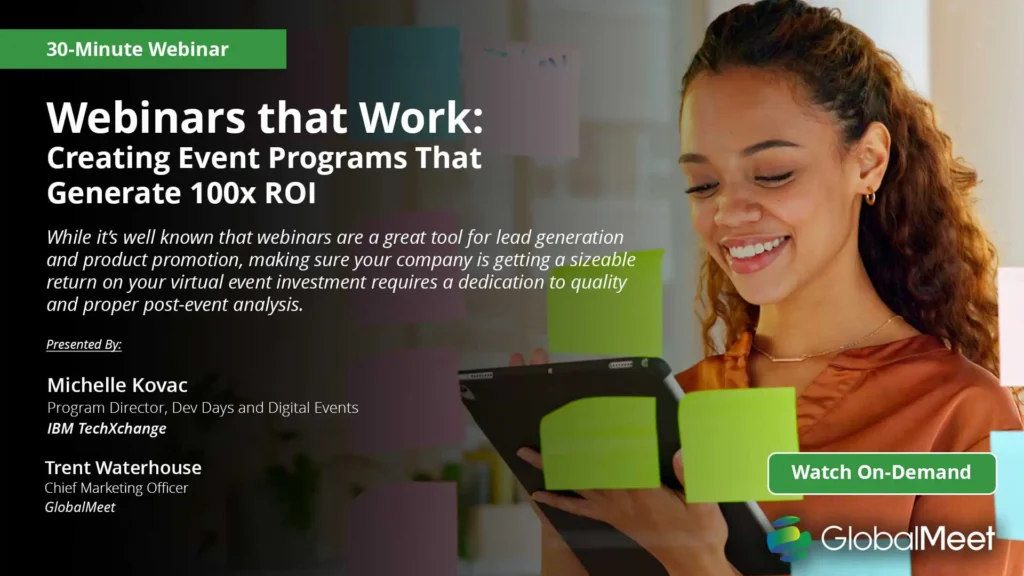
Event Management Platforms: Optimizing Your Event Planning
- by GlobalMeet Blog Team
- ,
In the evolving landscape of event planning, the integration of advanced technology is not just an advantage — it’s a necessity. Event management platforms have become indispensable tools for creating seamless event experiences and capturing critical data that can drive the success of future events. Our event management system is designed to optimize every aspect of event planning, from expanding your audience reach to integrating with CRM systems and providing expert management services.
Expanding Your Event Reach with Virtual and Hybrid Options
One of the most significant advantages of modern event management systems like GlobalMeet is their ability to expand the reach of your events through virtual and hybrid attendance options. In a world where geographical barriers and travel restrictions can limit attendance, these platforms ensure that your event can reach a global audience by allowing attendees to participate from anywhere in the world. This flexibility and convenience can significantly boost attendance numbers, giving your events a greater chance at success.
Hybrid events, which combine in-person and virtual elements, offer the best of both worlds. They provide the immersive experience of a live event while also catering to those who prefer or need to attend remotely. This flexibility not only increases your potential audience but also enhances the inclusivity and accessibility of your event, which can, in turn, raise your company profile with a wider audience.
CRM Integration: Capturing and Supporting Marketing KPIs
A critical feature of effective event management platforms is their ability to integrate seamlessly with Customer Relationship Management (CRM) systems. This integration is vital for capturing data that supports marketing Key Performance Indicators (KPIs), and allows sales teams to handle event-driven leads efficiently.
GlobalMeet’s event management platform integrates with your CRM, so all attendee interactions and data are automatically synchronized. This ensures that your sales team has access to up-to-date information about attendee behavior, interests, and engagement levels. Such data is invaluable for personalizing follow-up communications, nurturing leads, and ultimately converting them into customers.
Moreover, the integration supports marketing efforts by providing insights into which aspects of your event were most effective. By analyzing this data, you can refine your strategies for future events, focusing on what works best to engage your audience, and meet your marketing objectives.
Professionally Managed Event Offerings
Managing the technical aspects of an event can be overwhelming, especially if your team is already stretched thin with planning the content and presentations. This is where professionally managed event offerings become a game-changer.
GlobalMeet’s event management platform offers comprehensive management services, including everything from initial planning and setup to real-time technical support during the event and post-event analysis. Having a team of experts handle the technical details allows your team to concentrate on delivering high-quality content and engaging with attendees.
It also ensures that all technical aspects, such as live streaming, virtual breakout sessions, and interactive features, run smoothly, minimizing the risk that technical issues will disrupt the event and detract from the attendee experience.
Our expert services enhance the professionalism of your event, making you look better than ever.
Choosing the Right Event Management Platform
When selecting the right event management system for you it is key to consider which essential items meet your specific needs.
1. Comprehensive Features
Your platform should offer a wide range of features that cover all aspects of event planning and execution. This includes leads generation, registration management, attendee tracking, live streaming, virtual networking, and post-event analytics, just to name a few. A platform with robust features can handle diverse event types, from small webinars to large-scale conferences, so you never need to use more than one.
2. Customizability
Every event is unique, and your platform should allow for customization to match your specific requirements. This includes the ability to brand the event with your logos and colors, tailor the agenda, and create personalized experiences for different attendee segments.
3. User-Friendly Interface
An event management system with an intuitive and user-friendly interface is crucial for both event planners and attendees. It should be easy to navigate, reducing the learning curve and ensuring that users can access all features without frustration.
4. Integration Capabilities
As mentioned earlier, seamless integration with CRM systems is essential. Additionally, the platform should be able to integrate with other tools you use, such as email marketing software, social media platforms, and analytics tools. This integration ensures that all your systems work together harmoniously, enhancing efficiency and data accuracy.
5. Security and Compliance
Security is paramount when handling attendee data and hosting virtual events. Ensure that the platform you choose adheres to the highest security standards and complies with relevant regulations for global events, such as GDPR. This protects both your organization and your attendees.
6. Scalability
Your event management platform should be scalable to accommodate events of varying sizes and complexities. Whether you’re hosting a small meeting or a large conference, the platform should be able to scale up or down accordingly.
Conclusion
Event management platforms are transformative tools that can significantly enhance your event planning and execution processes. By expanding the reach of your events through virtual and hybrid options, integrating seamlessly with CRM systems to support marketing KPIs, and offering professionally managed event services, these platforms ensure that your events are successful, engaging, and data-driven.
Choosing the right platform involves considering a range of features, from comprehensive capabilities and customizability to user-friendliness and security. By investing in a robust event management platform, you can optimize your event planning efforts, deliver exceptional experiences, and capture the data necessary for continuous improvement and success.


